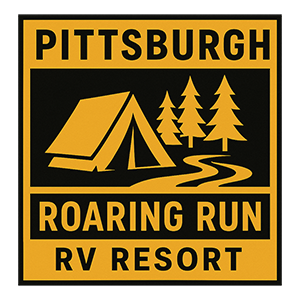If you’ve ever seen an RV fishtail down the highway or struggle up a hill, you know how important it is to match your trailer with the right tow vehicle. Choosing wisely doesn’t just make your travels smoother — it keeps you, your passengers, and your rig safe.
Whether you’re towing a lightweight travel trailer through Pennsylvania’s rolling hills or hauling a fifth-wheel toward Lake Erie, the right truck or SUV can make all the difference. Here’s how to pick the perfect tow partner for your RV adventures around Pittsburgh and beyond.
Why Your Tow Vehicle Matters
Your RV might be the heart of your travels, but your tow vehicle is the muscle. It affects everything — from fuel efficiency and braking distance to your ability to climb steep grades.
Pennsylvania and Ohio both offer beautiful but sometimes challenging terrain: long climbs through the Appalachians, curvy state highways, and unpredictable weather. A properly matched vehicle keeps you stable and in control no matter where the road leads.
Step 1: Understand Towing Terms
Before visiting a dealership, get familiar with a few key specs that determine safe towing capacity:
- GVWR (Gross Vehicle Weight Rating): Maximum total weight your vehicle can handle, including passengers and cargo.
- GCWR (Gross Combined Weight Rating): The total safe weight of the tow vehicle + trailer.
- Tongue Weight: The downward pressure the trailer applies to the hitch (typically 10–15 % of trailer weight).
- Payload Capacity: How much extra weight the vehicle can carry inside (gear, passengers, hitch weight).
You can find these numbers on a sticker inside your driver-side door or in the owner’s manual. Always stay under each limit — exceeding them risks damage, poor handling, and insurance issues.
Step 2: Match Vehicle Class to RV Type
Lightweight Travel Trailers (Under 5,000 lbs)
Mid-size SUVs or half-ton trucks like the Toyota 4Runner or Ford F-150 often handle these comfortably. Great for smaller couples’ campers or minimalist setups.
Mid-Size Trailers (5,000 – 8,000 lbs)
Go for a half-ton or three-quarter-ton truck — the Chevy Silverado 1500, Ram 1500, or GMC Sierra — equipped with a proper tow package.
Large Fifth-Wheels (8,000 + lbs)
You’ll want a three-quarter-ton or one-ton truck such as the Ford F-250/F-350, Ram 2500, or Chevy 2500 HD. Their reinforced suspensions and diesel options make long hauls safer and more efficient.
For detailed campsite tips once you’re ready to tow, check our Long-Term RV Park Near Pittsburgh article — perfect for drivers settling in for extended stays.
Step 3: Prioritize Safety Features
Modern tow vehicles come with advanced systems that make towing easier than ever:
- Integrated Trailer Brake Controllers help sync trailer brakes with your vehicle.
- Tow/Haul Modes adjust transmission shift points for better control downhill.
- Sway Control & Stability Systems detect trailer sway and apply corrective braking.
- Blind-Spot Monitoring for Trailers widens your field of vision.
These features are particularly useful on Western PA’s hilly roads or Ohio’s gusty interstates.
Step 4: Check Real-World Performance
Manufacturer ratings are a starting point — but terrain, cargo, and altitude affect real-world performance. If possible, test-tow a similar trailer at a local dealership or rent one for a weekend.
Talk to experienced campers at your resort or on travel forums. Their insight often reveals which models handle Western Pennsylvania’s steep climbs best.
Step 5: Don’t Forget Maintenance
A reliable tow setup depends on consistent maintenance. Before every trip:
- Inspect tire pressure and tread depth on both truck and trailer.
- Test brake lights and trailer brakes.
- Check hitch torque and safety chains.
- Change transmission fluid regularly when towing frequently.
For more detailed upkeep guidance, see our RV Maintenance Essentials post.
Towing in Pennsylvania and Ohio: Regional Considerations
Pennsylvania
Expect winding rural roads, steep inclines through the Laurel Highlands, and narrow bridges in small towns. Use a weight-distribution hitch for better balance and take corners slowly.
Ohio
Flatter highways make towing easier, but strong crosswinds near Lake Erie are common. Keep your sway bars tight and weight evenly distributed.
Both states require brake lights, safety chains, and working turn signals on trailers. For official roadside camping and towing guidance, review the
PA DCNR – Motorized Roadside Camping Rules.
Insurance and Registration Tips
Before hitting the road, double-check your insurance policy. Some cover the tow vehicle but not the trailer; others require separate coverage.
When crossing state lines into Ohio, ensure your trailer registration and inspection stickers are current — enforcement can vary by state park or toll road.
Fuel Economy and Cost Savings
Tow vehicles naturally consume more fuel, but a few smart habits help reduce costs:
- Maintain steady speeds and avoid rapid acceleration.
- Remove roof racks or accessories when not in use.
- Keep tire pressure at recommended levels.
- Plan routes to avoid heavy city traffic or unnecessary hills.
Pairing fuel efficiency with long-term site discounts can save hundreds each season — see our Monthly RV Park Rates in Pittsburgh article for budgeting ideas.
Where to Find Towing Help and Accessories
If you’re outfitting your rig, Western Pennsylvania has several great resources:
- Camping World of Pittsburgh (Apollo) – hitches, weight-distribution systems, brake controllers.
- Byerly RV Center (near Washington, PA) – towing classes and hands-on demos.
- Local 4×4 shops – perfect for upgrading suspension or adding towing mirrors.
Need overnight options during your setup process? Browse nearby campgrounds through RV Life Campgrounds – Pittsburgh Region.
Common Mistakes to Avoid
- Overloading the truck bed. Every cooler and generator adds weight fast.
- Ignoring tongue weight balance. Too much or too little can cause sway.
- Forgetting to upgrade mirrors. You can’t avoid what you can’t see.
- Skipping brake controller calibration. Trailer brakes that grab unevenly make descents dangerous.
- Underestimating stopping distance. Leave at least 5–6 seconds between you and the vehicle ahead.
Avoiding these missteps keeps your road trips safe and stress-free.
When to Upgrade
If you’re constantly at or near your max towing limit, it’s time to consider a heavier-duty truck. Excess strain shortens your vehicle’s life and can lead to costly repairs.
An upgrade also improves comfort — more torque, better cooling, and quieter rides make long hauls far more enjoyable.
Why Choosing the Right Tow Vehicle Matters
It’s easy to fall in love with an RV floor plan or slide-out feature, but your entire experience depends on what’s pulling it. The right tow vehicle means confidence on steep roads, smoother highway cruising, and safer handling when winds pick up.
Choose smart, tow safely, and you’ll spend more time exploring the hidden gems of Pennsylvania and Ohio — not waiting for roadside assistance.
Plan Your Stay With Pittsburgh Roaring Run RV Resort
Once you’ve got your towing setup dialed in, you’ll need a great place to park and relax. Pittsburgh Roaring Run RV Resort offers spacious sites, friendly staff, and easy access to the best RV routes in the region.
Hook up, unwind, and explore Western Pennsylvania with confidence — your perfect RV setup starts here.


